

The Gate of Heavenly Peace Part 2 - Tiananmen Square Protests. The Gate of Heavenly Peace - Part 1 - Tiananmen Square Protests. #六四 天安门母亲张先玲 Testimony of Zhang Xianling #TiananmenMother #TiananmenMasscre. Leica Camera’s advert depicting Tiananmen Square’s ‘Tank Man’ causes uproar from Chinese online. Why Photos of Tiananmen Square's “Tank Man” Were Hidden in a Hotel Toilet. Thirty years ago, Charlie Cole snapped one of the most iconic photos of the century.
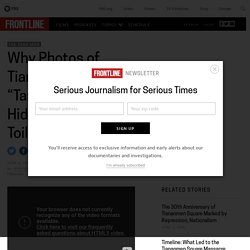
And then he stashed the undeveloped film in his hotel room toilet. It was June 1989, and Cole, a photojournalist, was in Beijing on assignment for Newsweek. After weeks of student-led protests calling for pro-democracy reforms, the Chinese government began to violently suppress the groups gathered at Tiananmen Square. Throughout their efforts to stanch protests, the People’s Liberation Army (PLA) is estimated to have killed hundreds to thousands of demonstrators. The exact number is still unknown. As violence broke out around them, reporters and photographers from the foreign press had to crouch beneath gunfire to document what was happening. The morning after violence reached its peak in Tiananmen Square, a column of tanks rolled east down Beijing’s Chang’an Boulevard. “I’m thinking, ‘This guy is going to be killed any moment now. “They were pretty satisfied they’d cleaned up the situation,” Cole added.
How China Has Changed Since Tiananmen Square. Students Tiananmen Square in Beijing on May 24, 1989.
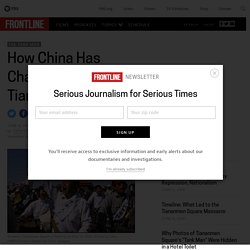
(Photo by Chip HIRES/Gamma-Rapho via Getty Images) Even after the People’s Liberation Army soldiers opened fire into crowds of civilians in Tiananmen Square on the morning of June 4, 1989, it seemed that some didn’t believe the bullets were real. For weeks, students had gathered in the Beijing square, demonstrating for more political freedom and less corruption in the Chinese government through sit-ins and hunger strikes. Still, they didn’t want to overthrow the one-party system, then led by de facto head Deng Xiaoping, and several government officials had advocated for a peaceful resolution to the protests. That never came. FRONTLINE spoke with Jean-Pierre Cabestan, a political science professor at Hong Kong Baptist University and author of “China Tomorrow: Democracy or Dictatorship?
U.S.-China Diplomacy After Tiananmen: Documents from the George H.W. Bush Presidential Library. What international coverage of Tiananmen got wrong. How Tiananmen crackdown left a deep scar on China’s military psyche. Thirty years on from Tiananmen: unpublished pictures of the student movement - Asia-Pacific. From a safe distance, people watch lines of soldiers and tanks surrounding Tiananmen Square.
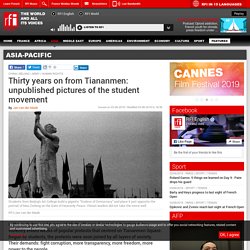
The army would only leave six months later when martial law was lifted. 6 June 1989. He Stayed at Tiananmen to the End. Now He Wonders What It Meant. After Tiananmen, China Conquers History Itself. I was giving a talk about Tiananmen Square’s legacy at an Australian university about two years ago when a young Chinese student put up her hand during the question-and-answer session.
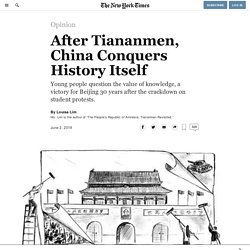
“Why do we have to look back to this time in history?” She asked. “Why do you think it will be helpful to current and nowadays China, especially our young generation? Do you think it could be harmful to what the Chinese government calls the harmonious society?” 30 years after the Tiananmen Square crackdown, dissidents in China and in exile speak to why the wounds still haven’t been healed. China’s ‘Black Week-end’ The Last Secret: The Final Documents from the June Fourth Crackdown edited by Bao Pu Hong Kong: New Century Press, 362 pp., HK$158.00 When Chinese law professor Xu Zhangrun began publishing articles last year criticizing the government’s turn toward a harsher variety of authoritarianism, it seemed inevitable that he would be swiftly silenced.
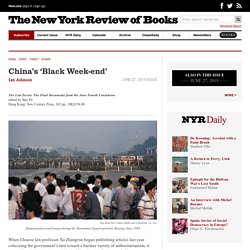
Sure enough, Xu was suspended from his teaching duties at Tsinghua University and placed under investigation. But then, remarkably, dozens of prominent citizens began speaking up. And, so this springAgain they are scared.1. Tiananmen’s Survivors and the Burden of Memory. Tiananmen: The Crackdown That Defined Modern China. 1989 and the Birth of State Capitalism in China. China’s Effort to Erase the June 4th Protests from History. Voices from Tiananmen. June 4 marked the 25th anniversary of a brutal military crackdown on pro-democracy protests led by students and residents in Beijing.
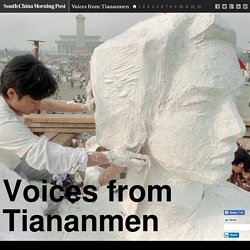
Hundreds of people were killed and many more were wounded when People's Liberation Army units rolled into Tiananmen Square, ending more than a month of peaceful protests seeking political reforms. In the following pages, former government officials, student leaders and other eyewitnesses revisit the momentous events of spring, 1989. These personal accounts, gathered from recent video interviews, as well as memoirs, shed new light on the hope and despair left by those days, which continue to haunt China a quarter century later. The eve of change Cultural upheaval and political demands At 21, Zhou Fengsuo thought he was marching towards a bright future. A physics student at Beijing’s prestigious Tsinghua University in the late 1980s, Zhou regularly attended literary salons and discussions where academics debated China’s political future. Video: JMSC HKU Li Lu.
NPR Choice page. Four Is Forbidden. Liusi.
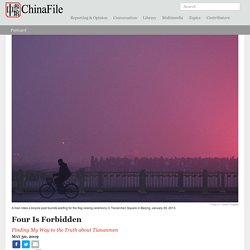
Six-four. The two-syllable word, spoken nonchalantly by our teacher, was a stone cast into the tranquil pond of a classroom. From each ripple rose a gasp, a murmur, or a perplexed face, with only one or two enunciating the question on many of our minds, “What is six-four?” It was the summer of 2002. I was 12 years old. Our instructor, a graduate student at a local university, regularly peppered discussions of spelling and syntax with social commentary.
“The University of Science and Technology of China (USTC) could never regain its past glory.” USTC was founded in Beijing in 1958, and forced to relocate to the southern city of Hefei during the Cultural Revolution. Bullets and Opium: Stories of surviving Tiananmen. Among the ever-growing number of Chinese dissidents living in Berlin is writer Liao Yiwu, who escaped to safety in Germany in 2011.
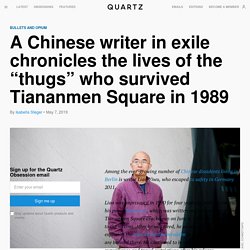
Liao was imprisoned in 1990 for four years for publicly reciting his poem, Massacre, which was written on the morning of the Tiananmen Square crackdown on June 4, 1989, and dedicated to the victims. After he was freed, he wrote a number of books exploring the lives of the downtrodden in China, all of which are banned there. He continued to be subject to intense surveillance and travel restrictions after his release. Atria/Signal Press. Resources for Teaching the 25th Anniversary of the Tiananmen Square Democracy Demonstrations.